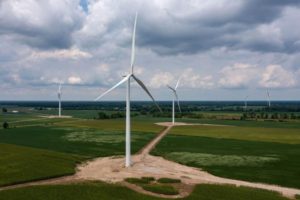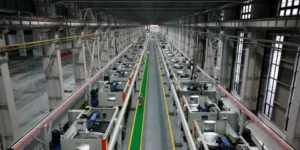Who’s behind a ballot initiative to repeal Michigan’s renewable energy siting laws?


DTE Energy has announced the commissioning of Meridian Wind, a 225 MW wind farm that is now the largest operating in Michigan. (Courtesy: DTE)
by Brian Allnutt, Planet Detroit
A new ballot initiative aims to overturn legislation passed late last year giving state regulators, not municipal governments, final say over large-scale solar and wind projects.
Proponents of the legislation say it’s a crucial step for moving solar developments forward at the pace needed for the state to meet targets under Michigan’s MI Healthy Climate plan, while opponents say the laws fly in the face of Michigan’s tradition of local control over land use decisions. But while ballot supporters are framing the initiative as a grassroots effort, a report from the watchdog group Energy and Policy Institute points to several connections between the ballot initiative leaders and fossil fuel industry.
Kevon Martis, a Lenawee County commissioner, is a spokesperson for the Citizens for Local Choice ballot initiative and Our Home, Our Voice, a nonprofit started last year. In a Jan. 18 letter to the Detroit News, Martis argued statewide control over renewable siting undermined local control, writing that “residents may have to drive hours to attempt to speak to unelected bureaucrats, let alone convince them about what they believe is best for their hometown.”
But according to the policy institute report, what Martis has framed as a grassroots effort has received messaging help from the Marketing Resource Group, a public relations firm that has represented the Wolverine Pipeline Company for decades. Wolverine is jointly controlled by Mobil Pipe Line Company, Sunoco Pipeline L.P. and others.
Martis is a senior policy fellow at the Energy and Environment Legal Institute, previously known as the American Tradition Institute, which has received backing from coal companies. One former fellow at ATI, John Droz Jr., worked with the Koch-funded American Legislative Exchange Council (ALEC) on a nationwide campaign to fight wind projects.
In 2012, Martis went to a national coordinating meeting for anti-wind activists and climate change deniers from fossil fuel industry-backed groups. Martis said in a meeting document that his goals were repealing Michigan’s renewable energy portfolio standard and seeking funding for lobbying efforts in Lansing.
In an October presentation to the Michigan House Energy, Communications and Technology Committee, Martis said Our Home, Our Voice is “funded entirely by rural residents and receives no industry support of any kind.” A spokesperson for E&E Legal told Planet Detroit the group will not be involved in the ballot initiative.
Martis also played down his connection to E&E Legal in an October Detroit Free Press article, saying of his fellowship there: “It came with no money, direction, responsibility, nothing. It’s an honorary title…I haven’t talked with anybody there in about five years.”
Large-scale projects and local opposition
Renewable energy advocates say moving final decisions on projects to the state level is crucial for overcoming the divisive politics and intimidation that have impacted township meetings, while farmers say the change is needed to protect their property rights.
Restrictive zoning ordinances have become a serious impediment to renewable energy nationwide, with at least 15% of counties across the country effectively blocking new, large-scale wind, solar or both. However, Michigan is now one of at least 13 states that control siting decisions for renewables projects or limit the authority of municipalities to ban them.
Justin Carpenter, director of policy at the nonprofit Michigan Energy Innovation Business Council, said the legislation is essential for meeting state climate goals. In Michigan, energy generation accounts for 29% of planet-warming emissions, and the state’s recently passed energy legislation set goals of 80% clean energy by 2035 and 100% by 2040.
“A lot of the decision-making at the local level was entirely based on misinformation and disinformation,” Carpenter said of some townships’ restrictive ordinances. He pointed to chemical contamination from solar fields as an issue discussed at township meetings but not supported by research.
He added that the siting legislation includes measures to protect residents. This includes requiring developers to provide $2,000 per megawatt in community benefits and giving municipalities as much as $75,000 each to represent their interests if a siting decision goes before the MPSC.
Money for signatures
Some wonder if Our Home, Our Voice won’t need interest group help to get the 446,198 signatures needed for a ballot initiative and the many additional signatures groups usually collect to make up for those that aren’t accepted.
“They said it’s gonna cost them $7 (million) to $10 million to do this. They’re not getting that from…$10 or $20 contributions,” Dick Farnsworth, with Patriots of Montcalm, a group supporting landowners who want to put renewable energy projects on their properties, told Planet Detroit. According to Ballotpedia, Michigan’s 2022 ballot initiatives cost around $8 million on average.
Matt Grossmann, a political science professor at Michigan State University, said interest groups generally fund ballot initiatives. For example, the 2018 Promote the Vote ballot initiative received 86% of its funding from the Michigan and national American Civil Liberties Union branches. Only 2% of the funding came from small donors.
Industry groups appear to be providing Martis and his allies support for their messaging. A November post by Dave Anderson, EPI policy and communications manager, noted two employees at Marketing Resource Group authored portions of Our Home Our Voice’s website, instructing users on how to draft and pass a local control resolution.
MRG didn’t respond to a request for comments; Martis didn’t reply to questions about fundraising for the ballot initiative.
Writing on behalf of Citizens for Local Choice, Martis said in a statement, “The Citizens for Local Choice petition drive is about one question: who should make major local land use decisions: know-it-all state lawmakers and their political appointees in Lansing; or local residents in cooperation with their local official(s). We support local choices.”
Farnsworth said that those who talk about local control are actually undermining landowners’ property rights and often don’t understand the financial pressures facing farmers. He owns a farm in west Michigan’s Montcalm County that has been in the family since 1880, and said a wind lease is necessary for his family to maintain the property as a farm.
“Opponents say they don’t want wind and solar projects because it would disturb the rural nature of their environment,” he told the House Energy Committee in testimony submitted in October. “The irony is if they stop these projects, property owners like us will be forced to make some hard choices between keeping it as a farm or selling it off for development.”
The politics of fear and intimidation
In his presentation to the House Energy Committee, Martis raised several concerns, such as flashing lights from wind turbines or the potential for noise pollution. The siting legislation allows wind turbines to emit noise up to 55 decibels on average, about the volume of a household refrigerator. Martis pointed to a World Health Organization recommendation to keep noise below 45 dB because “noise above this level is associated with adverse health effects.”
However, the Department of Energy said the average wind turbine noise for those within 1,000 feet is 35 to 45 dB or the same volume as a suburban neighborhood at night. And a 2015 analysis of 25 studies found no connection between wind turbines and the health problems of nearby residents.
Martis has advocated for relying less on nuanced arguments about potential harms from renewable energy, saying only one thing would motivate politicians: fear.
“Your county commissioners will not be moved by facts,” he wrote in a Facebook post. “They will be moved by political fear.”
A 2020 Facebook post included a picture of a truck destroyed by anti-wind protestors in Australia. “I don’t condone this at all,” Martis wrote. “But I have warned state legislators that the true cost of 40-50 or 60% wind generation in any given state must include the cost of a new capitol building. Because folks won’t take it and will resort to extreme actions.”
This strategy has meant recalling township trustees who supported renewable energy. Jed Welder, a farmer and Sidney Township trustee who voted against a restrictive ordinance on wind, was recalled even after the ordinance was passed, a move Farnsworth saw as retaliation.
Several who spoke with Planet Detroit said they experienced this fear-based rhetoric on a visceral level at township meetings. Farnsworth said he stopped by a renewable energy meeting in Maple Valley Township, and when he went to leave, two men told him he had to sign in. When he refused, they chased him as he ran to his car.
And Mike Buza, a Sierra Club member and renewable energy advocate who often speaks at public meetings, said he’s had people follow him to his car or block him from leaving a township meeting.
“One guy told me God would make me pay for what I said,” Buza said. Township officials and residents have recounted similar experiences in several communities.
Farnsworth said the Michigan Public Service Commission has the necessary expertise to help decide on the siting for these large energy projects just as they oversee pipelines and energy transmission infrastructure.
And he hopes that by moving the venue for these disputes to Lansing, township politics can become less acrimonious and that some who were intimidated by fights over wind and solar will want to run for office again.
He added that Patriots of Montcalm will be doing outreach to counter what he said was misinformation from the other camp.
“We look at it as harvesting the sun and the wind,” he said. “It’s just another opportunity to use your land.”
This article first appeared on Planet Detroit and is republished here under a Creative Commons license.



